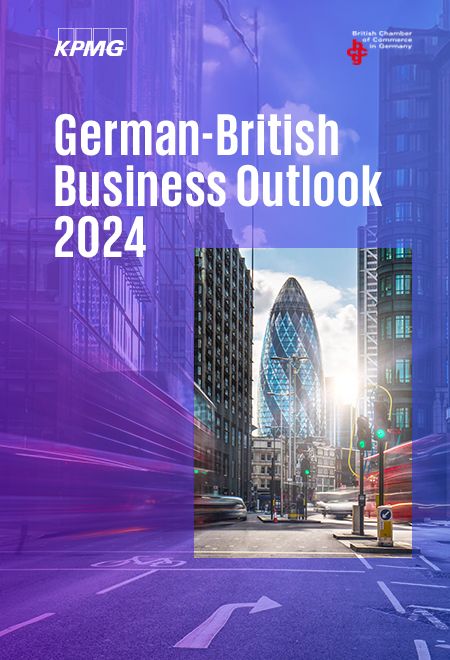Brexit was a turning point - and the effects on bilateral German-British business relations are still having an impact today. Be it additional administrative work, logistics costs or customs duties: Various trade barriers lead to ongoing friction. The result is a drop in sales and profits for companies. At the same time, a new wave of non-harmonised laws in the UK and the EU will lead to additional burdens in 2024. Nevertheless, there are also opportunities for new collaborations. These are the remarkable key findings from the German British Business Outlook, which was compiled for the sixth time in 2024 by KPMG AG Wirtschaftsprüfungsgesellschaft and the British Chamber of Commerce in Germany (BCCG). The study is based on a major survey on the business expectations of German and British companies.
Andreas Glunz
Managing Partner International Business
KPMG AG Wirtschaftsprüfungsgesellschaft
Only 6 per cent report improved business situation since Brexit
More than one in two companies (52 per cent) in the German-British economic corridor report a deterioration in their business situation compared to 2020, the year in which Brexit came into force. The proportion of those reporting a significant deterioration almost doubled between 2022 and 2023, from 9 per cent in the previous year to 16 per cent. Compared to the previous year, the proportion of companies stating that their business had improved since Brexit halved from 13 per cent to 6 per cent.

How the business situation of the companies surveyed has changed.
The three biggest burdens in the German-British economic corridor
Percentage of companies surveyed
Higher administrative expenses
Increased logistics costs
Higher customs duties
Sales and profit trends are mixed
According to the survey, 38 per cent of companies were able to increase their turnover in 2023, but almost as many (36 per cent) recorded a decline in turnover. Only 29 per cent of companies achieved growth in profits after tax, while 39 per cent saw their profits fall. There are no signs of any significant improvement for the current financial year: Just under one in three companies (31 per cent) expect less turnover. Over the next five years, more than one in four companies (26 per cent) also anticipate a continued decline in turnover.

The decline in UK-German trade volume is dramatic. Since the Brexit referendum in 2016, the trade volume has fallen from 38 million tonnes to 22 million tonnes. Inflation has masked this sharp decline. The supposed turnaround in 2022 was deceptive: imports from the UK to Germany rose sharply again that year for the first time since 2016. In retrospect, however, it is clear that this was primarily due to rising crude oil imports at peak prices, as oil and gas imports from Russia to Germany had to be substituted.

New wave of laws and regulations in 2024 will affect German-British business relations
In 2024, a wide range of new regulations will come into force in the UK-EU corridor, which were initially postponed. The "Border Target Operating Model", which means additional controls and documentation requirements for certain product groups such as animals, plants and food, will have a particularly significant impact. 34 per cent of the companies surveyed are affected. 28 per cent expect the gradual replacement of EU regulations with new UK regulations following the expiry of the "Retained EU Laws" to have a significant impact - and around 30 per cent expect bureaucratic obstacles and significantly rising costs as a result of the Carbon Border Adjustment Mechanism (CBAM), which the EU is introducing for imports into its community of states and which will differ from the UK CBAM. Just under one in four companies (24 per cent) also see their German-British business activities affected by the new EU supply chain law.
Further analyses, detailed background information and practical recommendations for action on six topics that are of great importance in view of the recently introduced and planned regulatory adjustments can be found in our white paper "Brexit 2.0".
"It is a myth to believe that companies will be able to cope with Brexit. In fact, various laws will be passed in the UK and the EU in 2024 and the following years, none of which are harmonised and have a decoupling effect. This will lead to considerable additional burdens for companies in the German-British corridor."
Andreas Glunz, Managing Partner International Business, KPMG AG Wirtschaftsprüfungsgesellschaft
The most important future fields of cooperation: Focus on megatrends
The megatrends of digitalisation, ESG and climate protection remain the most important business areas for cooperation (47% and 33% respectively) for British and German companies. The relevance of digitalisation has increased significantly by eight percentage points compared to the previous year. The areas of energy generation and energy security (33%, eleven percentage points more than in the previous year) and defence (26%, an increase of seven percentage points) are also increasingly coming into focus.
Investment plans provide optimism
The general reluctance to invest in the UK has been gradually declining since 2021. Back then, 69 per cent of companies had no investment plans at all. In the current survey, the figure is 48 per cent. Within three years, seven per cent of respondents are planning projects with an investment volume of more than 250 million euros - not a single company was planning this in the previous year. And 38 per cent are planning smaller investments of up to five million euros, an increase of five percentage points.
German-British Business Outlook: Hintergrund und Methodik
KPMG in Germany and the BCCG surveyed both German subsidiaries with headquarters in the UK and British subsidiaries with headquarters in Germany. It was conducted between 22 January and 28 February 2024. A total of 173 companies took part. 82 per cent of the companies are headquartered in Germany, 18 per cent in the UK. Of the companies headquartered in Germany, 42 per cent have been active in the UK for more than two decades and 19 per cent for more than 50 years.




